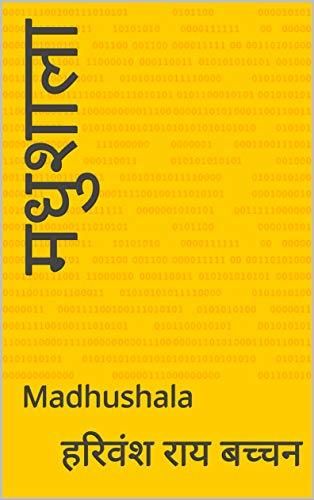"Madhushala" by Harivansh Rai Bachchan: A Journey of Life, Philosophy, and the Search for Meaning

Harivansh Rai Bachchan's Madhushala is a celebrated masterpiece in Hindi literature, known for its profound philosophical undertones, rich symbolism, and lyrical beauty. First published in 1935, the collection of poems delves deep into the complexities of life, human emotions, and the pursuit of meaning, often through metaphors of wine and the tavern. The central theme of Madhushala revolves around the idea of liberation, self-discovery, and the search for truth, with the tavern and wine serving as symbols of life’s pleasures, struggles, and the path to enlightenment.
In this article, we explore five of the most impactful quotes from Madhushala, which provide a glimpse into the essence of Bachchan’s philosophy and poetic genius.
1. "Madhushala ki ye shabnam hai, jo kaam pyaas ki bujhane ka hai"
Translation: "This is the dew of the tavern, meant to quench the thirst of desire."
This line encapsulates Bachchan’s central metaphor of the "madhushala" or tavern. The tavern, in this context, is not just a physical place but a symbol of the human journey towards satisfaction and fulfillment. The dew, representing fleeting moments of joy, is meant to quench the insatiable thirst for knowledge, love, and life’s deeper meaning. The idea of satisfying one’s inner thirst with transient pleasures is a recurring theme throughout Madhushala.
2. "Jab tak na ho apna rang, tab tak sabhi rangon mein mil ja"
Translation: "Until you discover your own color, blend with all the colors around."
This powerful quote emphasizes the journey of self-discovery and the importance of experiencing life fully before finding one’s true self. Bachchan suggests that individuals must embrace different aspects of life, learn from various experiences, and understand their inner self by exploring the world around them. The imagery of colors symbolizes diversity, change, and the beauty of exploration before finding one’s identity.
3. "Zindagi ke har mod par, ek nayi madhushala milti hai."
Translation: "At every turn of life, a new tavern awaits."
Here, Bachchan reflects on the cyclical nature of life, where each phase presents new challenges, pleasures, and opportunities for growth. The "madhushala" in this line signifies the ever-changing experiences of life, suggesting that every stage brings its own lessons, joys, and revelations. It reminds readers that life is an ongoing journey and that each new encounter is an invitation to experience something profound.
4. "Madhushala mein ek baat hai, jo bhi piye, woh apna raasta paaye."
Translation: "There is one truth in the tavern: whoever drinks, finds their own path."
This quote speaks to the idea of personal enlightenment and the power of experience in shaping one's destiny. Drinking from the "madhushala" is not merely about indulgence; it symbolizes the exploration of life’s many possibilities and the pursuit of understanding. By engaging with the world in an open and uninhibited way, individuals discover their own paths in life, shaping their identities and destinies.
5. "Na tu dharm hai, na tu kaam hai, tu sirf ek jeevan hai."
Translation: "You are neither religion nor duty, you are simply life itself."
In this profound quote, Bachchan breaks down the concept of life beyond societal and religious obligations. He challenges conventional structures and calls for the celebration of life in its purest form. By stating that life itself is all-encompassing, Bachchan urges individuals to embrace their existence without being confined by rigid definitions or duties imposed by society. This line advocates for freedom and the acceptance of life as a fluid, evolving experience.
The Significance of "Madhushala"
Bachchan’s Madhushala is a powerful exploration of life, transcendence, and the philosophical search for meaning. Using the metaphor of wine and the tavern, Bachchan crafts a vision of life that is both deeply spiritual and inherently human. The poems celebrate the complexities of existence, encouraging readers to embrace their desires, experiences, and the journey toward self-discovery.
The work stands out for its lyrical beauty, rhythm, and the rich emotional depth with which Bachchan engages with universal themes. His reflections on life, loss, love, and liberation remain relevant even today, making Madhushala a timeless classic in Indian literature.
Why You Should Read "Madhushala"
- Timeless Philosophy: The themes of life, self-exploration, and existentialism make Madhushala relevant even in contemporary times, offering readers an opportunity to reflect on their own life journeys.
- Rich Symbolism: Bachchan’s use of metaphors like wine and the tavern offers layered meanings, making the poems open to various interpretations, enriching the reading experience.
- Emotional Depth: The poems evoke a range of emotions, from joy to sorrow, providing a deep connection with the reader.
- Cultural Significance: Madhushala holds a special place in the Hindi literary canon, and reading it provides valuable insights into Indian culture, poetry, and philosophy.
- Lyrical Beauty: Bachchan’s mastery of language and rhythm creates an immersive experience for readers, making Madhushala not only a philosophical work but also a beautiful piece of poetry.
Harivansh Rai Bachchan’s Madhushala is not just a collection of poems—it is a philosophical journey through the joys, pains, and mysteries of life. The quotes highlighted above are just a glimpse of the profound wisdom that pervades this timeless work. Madhushala encourages readers to look beyond the mundane, embrace their inner desires, and find their own path in the ever-evolving journey of life. For anyone interested in philosophy, poetry, and introspection, this book is a must-read.